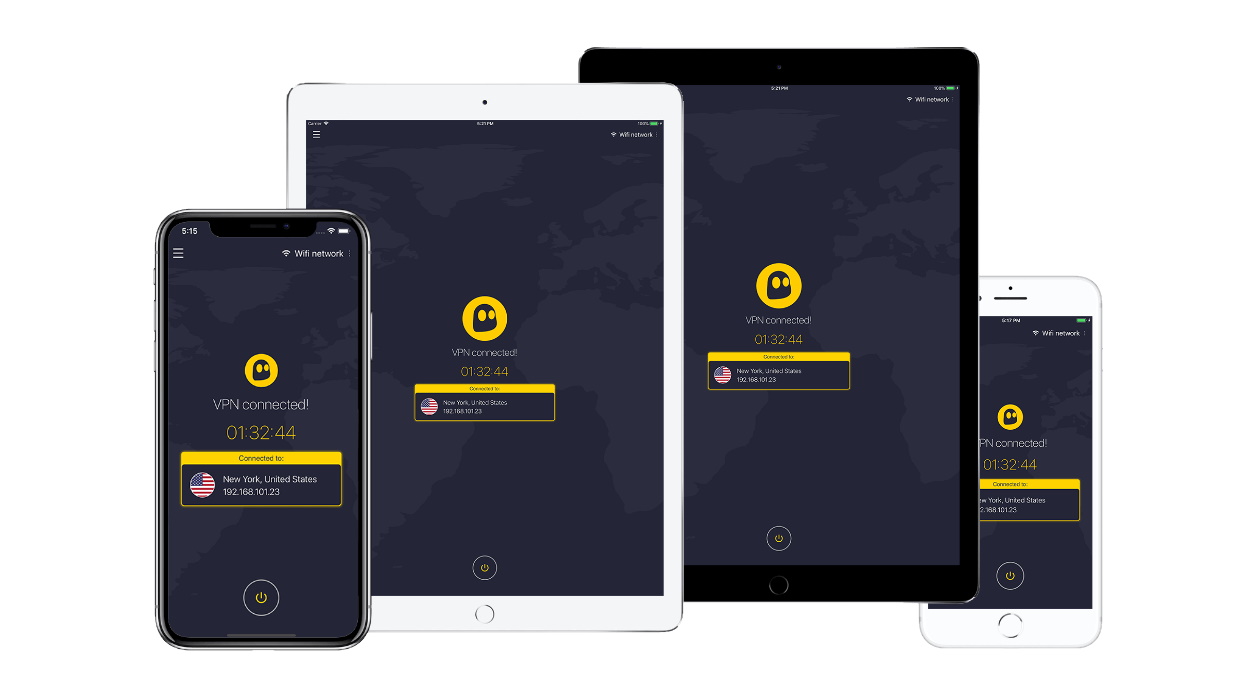CyberGhost vs Surfshark: Which provider is best?
Between these two great value VPNs, who will come out on top?

You don’t need to spend a fortune to pick up a top-tier VPN. While there are great premium VPN options out there, there’s also some fantastic VPNs which pride themselves on being affordable. CyberGhost and Surfshark are two perfect examples, which is why they both feature on our best cheap VPN list. These two providers offer impressive features and solid security at competitive pricing points, but which one truly packs more value and functionality into its subscription?
To help you decide, I’ve compared these budget-friendly VPNs head-to-head, examining their strengths and weaknesses across several crucial areas such as price, privacy, performance, streaming capabilities, app availability, and extra features. Read on and you’ll find out which budget provider truly provides the best value for money.
CyberGhost vs Surfshark at a glance
| Header Cell - Column 0 | CyberGhost | Surfshark |
|---|---|---|
| Number of servers: | 11,700+ | 3,200+ |
| Server countries: | 100 countries | 160+ in 100+ countries |
| Maximum simultaneous connections: | 7 | Unlimited |
| Money back guarantee: | 45 days | 30 days |
| Lowest monthly cost: | $2.19 | $2.19 |
CyberGhost vs Surfshark: Pricing
Surfshark has a pretty standard pricing structure, starting at $15.45 per month for its shortest plan without any optional extras. This is about three dollars more than the standard monthly price you’d expect from a top-tier VPN provider, but once you get down into the long-term packages Surfshark begins to shine. The twelve-month plan costs $2.79 per month with three extra months free, working out at $41.85 for fifteen months. Doubling up, the two-year plan comes out to $2.19 per month for a total of $59.13 for twenty seven months. Surfshark also provides a 30-day money-back guarantee on both the 12 and 24 month plans.
CyberGhost, on the other hand, has a slightly different pricing structure. The monthly plan is priced at $12.99, which is a little bit cheaper than Surfshark and more in line with the industry standard for VPN pricing. Their six-month plan costs $6.99 per month, which comes out to $41.94 for six months. Considering you can spend roughly the same amount with Surfshark for more than twice the subscription length, it doesn’t make much sense to pick Cyberghost’s six month plan. However, CyberGhost offers the cheapest plan overall with a two year deal that includes four free months, working out at $2.03 per month or $56.94 overall.
CyberGhost also offers a longer period to test out the VPN than Surfshark, as both the six month and two year subscription plans come with a whopping 45-day money-back guarantee, which is one of the longest in the industry. Even the monthly subscription comes with a 14-day money-back guarantee, which is more than enough to work out whether CyberGhost is right for you.
There’s also a few paid add-on features you can tack on at checkout for CyberGhost, including a dedicated IP for $5 a month, a security suite for Windows with antivirus protection and security updates for $4.50 a month, and CyberGhost’s own password manager for $3.49 a month.
Surfshark offers less granularity when it comes to add-ons, but far more added value. For an extra $0.50 a month you can upgrade to Surfshark One, which adds a whole bunch of extra security tools. These include Surfshark Alert, which notifies you if your personal information appears in data breaches, Surfshark Search, a privacy-focused search tool that cuts out ad-trackers, and Surfshark Antivirus, which is… an anti-virus.
I’d say not to be fooled by Surfshark’s high monthly price compared to CyberGhost. If you’re considering a long-term plan, Surfshark works out almost as cheap as CyberGhost and if you upgrade to Surfshark One you get so much more for almost no additional cost.
CyberGhost vs Surfshark: Privacy and logging
You need to trust your VPN provider. When you connect to a VPN, you’re sending all of your internet traffic through their servers. If you can’t be sure they’re not logging your traffic, you shouldn’t even consider using them. This is why it’s so important to do some due diligence and check that any VPN provider you’re using has a strong third-party audit policy.
From a pure VPN security point of view, Surfshark and CyberGhost are basically neck and neck. Both employ AES-256 encryption to transmit your data, which is currently best-in-class encryption for data transfer. Each provider supports OpenVPN too, as well as WireGuard. OpenVPN is trusted worldwide as a secure VPN solution, whereas WireGuard is a faster VPN implementation designed to take up less resources at the cost of a reduced featureset. Both protocols are open source, so they’ve been audited over and over again by the VPN industry for safety.
Surfshark’s claimed a no-logs policy for years, which was finally verified in 2022 when they contracted Deloitte to perform a third party audit of their infrastructure. This means that you can be confident Surfshark does not store any information that could identify you. They’ve also commissioned several audits by Cure53 to ensure their servers are secure. To date, Surfshark has had no major incidents or data leaks, cementing their reputation as a reliable privacy-focused VPN provider.
Speaking of reputation, CyberGhost’s privacy reputation is amongst the best in the industry. To date, they haven’t had a single data leak. They’re also based out of Romania, which makes CyberGhost not legally required to collect logs on their users. Of course, a no-logs policy means nothing without an independent audit, which is why they’ve commissioned Deloitte twice to ensure that their policy is both honest and technically valid. CyberGhost even has a bug bounty program, which gives security experts a cash incentive to find and report any vulnerabilities on CyberGhost’s apps.
CyberGhost vs Surfshark: Performance
All VPNs will slightly reduce the top speed you get from your internet connection, but it’s important to make sure the provider you choose can handle your bandwidth. Despite being budget providers, Surfshark and CyberGhost both excel when it comes to speeds. Our testing with CyberGhost over OpenVPN averaged out at 360Mbps, but Surfshark almost doubled that at 640Mbps. Very impressive. We also tested out WireGuard speeds for both providers, and found that CyberGhost posted average speeds of 760Mbps, better than both provider’s OpenVPN speeds. Even better, but this still pales in comparison to Surfshark’s top speeds of 950Mbps using WireGuard.
Pretty much any web application you could think of would perform more than well enough under either provider, as even the lowest of these speeds is capable of supporting multiple 4K streams simultaneously. That said, the crown for performance undoubtedly has to go to Surfshark here.

CyberGhost vs Surfshark: Streaming
Once you’re sure that a VPN provider isn’t stealing your data and can comfortably support a few web applications, you can move on to thinking about the fun stuff: Streaming! Of course, you need to make sure any VPN provider can back up their claims of being able to get you access to geo-restricted content. Streaming services are always on the watchout for VPN users connecting to their servers, so it’s important you pick a provider that’s constantly refreshing their IP pools to avoid being blocked.
There’s no better way to work out which VPN provider is the best at unblocking than to get our hands dirty and do some testing. To evaluate the effectiveness of a VPN in this regard, we test its ability to access Netflix libraries in the UK, US, Canada, Japan, and Australia, as well as popular services like BBC iPlayer, Amazon Prime, and various smaller regional sites.
Surfshark isn’t as well known as, say, NordVPN, when it comes to unblocking streaming services. With that in mind, it capably handled every test I threw at it. It successfully unblocks Netflix libraries in the US, UK, Australia, Canada, and Japan. Looking further afield, Surfshark can access UK platforms like BBC iPlayer, ITV, Channel 4, as well as Australian platforms like 9Now and 10 play. It also works seamlessly with other streaming-specific platforms like Amazon Prime and Disney Plus. Top marks all around.
CyberGhost performed almost as well here. The only notable difference is that I couldn’t access 10 play at all, which is a little disappointing but not unexpected. Despite this minor limitation, CyberGhost's dedicated streaming servers generally provide a smooth and consistent streaming experience, with minimal buffering and fast load times.
It’s pretty close, but Surfshark just about edges it out here with slightly better coverage of niche streaming services.

CyberGhost vs Surfshark: Apps
Although I’m going to talk about my preferences when it comes to VPN design, you might have a completely different take on how you prefer your VPN app to look. So, take my views with a pinch of salt.
Surfshark's desktop app is deceptively simple at first glance, but there’s a lot of functionality stuffed into it. You’re presented with a simple connect button alongside a location list that’s pretty smartly laid out. There’s the usual recommended servers, previously used servers, and a search bar for easy access, but there’s also separate tabs for MultiHop servers, Static IP servers, and Dedicated IP servers.
The options tabs at the side are similarly sleek, evoking the sort of effortless minimalism you’d see on a Mac. Once you start enabling options inside the menu, these appear on the connect panel to the left of the app. One aspect of this I actually really like is that if you click on the text for any of those options in the panel, it actually acts as a quick-select that takes you straight to the relevant tab for that option so you can customize it. The downside is that once you’ve turned a few features on, your connect panel can start to look pretty cluttered, but it’s a small price to pay for quick functionality.
CyberGhost’s desktop app also looks pretty simple at first. The app opens to a simple main screen with a large power button for quick connections, but click on the folding menu and you’ll be presented with a full location list and options menu attached onto the connection panel. The server menu is well-organized, offering servers categorized by purpose, such as streaming, torrenting, or gaming. This makes it easy for you to find the best server for your needs quickly without having to connect and reconnect to servers to test them. This is especially true of the dedicated streaming servers, which are labeled with the streaming service they’re optimized for. This is a feature that I wish basically every VPN had, honestly.
If I have any complaints, it’s that the app can sometimes feel a bit cluttered with its numerous features and settings, which could be presented in a slightly more elegant way. However, I feel that overall CyberGhost’s app is a little bit more useful than Surfshark when it comes to finding the servers you need quickly, even if it doesn’t look as smart.
CyberGhost vs Surfshark: Extra features
It’s rare now to see a VPN that doesn’t come with a wealth of extra security and convenience features. Just providing basic VPN capabilities doesn’t cut it anymore, especially not in such a competitive market. Of course, there’s a big difference between functionality designed to make your life easier and superfluous fluff designed to keep the marketers happy, so let’s take a closer look at whether these VPNs offer anything useful.
Surfshark comes with a lot of extras bundled into their Surfshark One subscription, but I want to dial in on just a few of them. First, there’s Incogni. It’s actually a separate data removal service that you get a subscription for when you sign up to Surfshark. Once you’re signed up to Incogni, they regularly submit requests for removal of your data from various marketing databases and data brokers. This is a no-brainer if you’re concerned about data privacy.
Next up is Alternative ID. It’s an automated service which provides you with disposable email addresses and other identification details to use when signing up for online services. It’s not much different from just starting a new online identity yourself, but it’s pretty handy to have Surfshark manage most of the annoying details of account signup and identity generation for you.
Surfshark also includes an antivirus, providing comprehensive malware protection alongside its VPN services. There’s not much to say here. It works, it’s useful, and it’ll save you a headache if you accidentally download a trojan.
It’s almost overwhelming how many extra features are built into Surfshark, but how does CyberGhost compare? Well, for an extra fee you can enable Windows Security Suite includes additional protections like antivirus and security updates management, augmenting the existing security software built into Windows. This is useful if you’re not already using another antivirus provider, but I wouldn’t choose CyberGhost over another AV for the sake of $4.95 more a month.
CyberGhost's other add-on is a dedicated IP. You get all the advantages of a static IP, such as being able to host web-services without having to constantly update your IP address, while also getting an IP address nobody else is using. One of the biggest problems with VPNs is being locked out of reputation-based systems because other users have sent spam or launched attacks from that IP. You’ve probably noticed the effects of this if you’ve turned on a VPN and suddenly have to fill out more CAPTCHAs, but with a dedicated IP from CyberGhost all of these issues pretty much disappear.
For no extra cost, CyberGhost provides optimized servers tailored for specific activities like streaming, gaming, and torrenting. These servers ensure better performance and reliability depending on what you’re using them for. For example, the streaming servers are designed to bypass geo-restrictions on popular platforms like Netflix and BBC iPlayer, while gaming servers offer lower latency for a smoother online gaming experience.
I have to say that while CyberGhost does provide a strong showing in terms of extra features, Surfshark just blows it out of the water. Surfshark One is one of the best overall VPN security packages on offer, and it’s an incredibly cheap upgrade compared to the base price of Surfshark.

CyberGhost vs Surfshark: The bottom line
I think Surfshark is the clear winner when it comes to budget VPNs, for one overwhelming reason: Unlimited connections. With one Surfshark subscription, you can connect as many devices as you like. CyberGhost only allows for seven devices connected at once, which is slightly under industry standard.
Even if I ignored this aspect, Surfshark comes ahead on just about every objective metric I’ve looked at. It unblocks more sites, it offers greater speeds, and it provides more value for money. Yes, CyberGhost does work out slightly cheaper when you factor in the extra free months, but Surfshark gives you more bang for your buck.
That said, there is one area in which I’d recommend CyberGhost over Surfshark. Very few VPN providers offer a dedicated IP service, so if it’s important that you’re able to consistently hold an IP address (such as if you’re regularly gaming online) then CyberGhost is the better choice.
If you’re willing to spend a little bit more money on a VPN service, it’s also worth checking out NordVPN. It’s the best VPN on the market currently, offering a fantastic combination of speed, reliability, unblocking capabilities, and all at a reasonable price.
Disclaimer
We test and review VPN services in the context of legal recreational uses. For example:
1. Accessing a service from another country (subject to the terms and conditions of that service).
2. Protecting your online security and strengthening your online privacy when abroad.
We do not support or condone the illegal or malicious use of VPN services. Consuming pirated content that is paid-for is neither endorsed nor approved by Future Publishing.
Sign up to get the BEST of Tom's Guide direct to your inbox.
Get instant access to breaking news, the hottest reviews, great deals and helpful tips.

Olivia joined Tom's Guide in October 2023 as part of the core Tech Software team, and is currently VPN Commissioning Editor. She regularly uses VPNs to make sure they deliver what they promise, and specializes in testing VPNs with streaming sites.
- Sam DawsonVPN and cybersecurity expert
